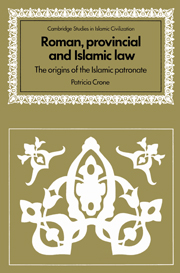Summary
The history of walā'
We are now in a position to attempt an overall survey of the development of the Islamic patronate. Its history may be reconstructed along the following lines.
Once the initial phase of the conquests was over, the Arabs were confronted with the problem of defining the status of non-tribal members of their society. Among themselves, the dividing line between tribesmen and non-tribesmen had largely disappeared. Just as the Persians of Ha jar were accepted as Arabs on the rise of Islam, so weavers, smiths and paramonar servants became warriors on a par with the free. The lowly origins of such persons were not necessarily forgotten, or even forgiven, but they ceased to be a bar to membership: all natives of the peninsula who participated in the conquests as adherents of the new faith were henceforth equal members of a new commonwealth distinguished from the rest of the world by Arab ethnicity, common faith and immense success. It was newcomers recruited from outside the ranks of this commonwealth who posed a problem.
During the early wars of conquest even non-Arabs from outside the peninsula had been able to benefit from this reshuffle of the tribal commonwealth; for as long as the Arabs were eager for proselytes to confirm the truth of the faith and for soldiers to swell their armies, even complete foreigners were eligible for admission as Arabs.
- Type
- Chapter
- Information
- Roman, Provincial and Islamic LawThe Origins of the Islamic Patronate, pp. 89 - 99Publisher: Cambridge University PressPrint publication year: 1987

